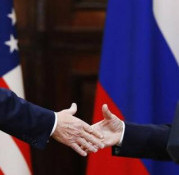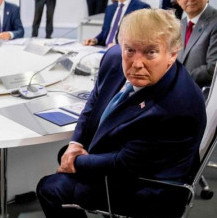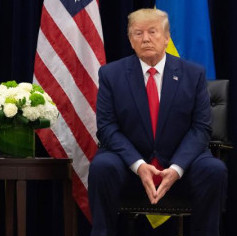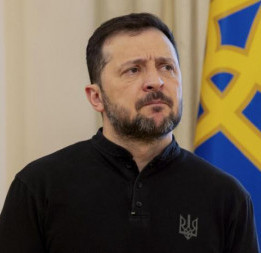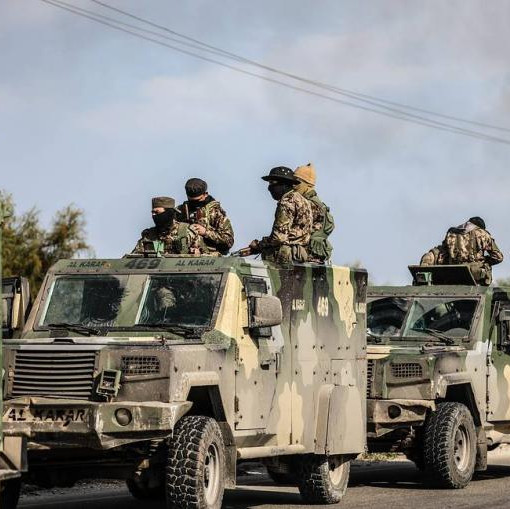
The European Union introduces new sanctions on Russia, the US and EU disagree on the Ukraine issue, and Turkey is ready to become a Russia-Ukraine talks venue. These stories topped the headlines in Tuesday’s newspapers across Russia, according to TASS news agency.
Vedomosti: EU imposes new anti-Russian sanctions amid rift with US over Ukraine
The Council of the European Union (EU) adopted the 16th anti-Russian sanctions package on February 24, 2025, the third anniversary of the launch of Russia’s special military operation in Ukraine. The press release noted that it "targets systemically important sectors of the Russian economy such as energy, trade, transport, infrastructure, and financial services" and "is designed to further ramp up pressure" on Russia.
It includes a ban on importing primary aluminum from Russia, restrictions against 48 private individuals, sanctions against five Russian ports which, in Brussels’ opinion, are engaged in sanctions circumvention, as well as measures against six Russian airports. In the financial sphere, the EU has approved disconnecting another 13 Russian banks from the SWIFT payment system.
Yet another EU sanctions package shows that the West is playing the good cop/bad cop game with Russia, said Ivan Skorikov, head of the Ukraine sector at the Institute of CIS Countries. The "good cop" is the US which is trying to convince Russia to agree to a one-sided deal of a ceasefire and freezing the conflict, while Europe is "showing its teeth" which benefits US President Donald Trump in the context of shifting the burden of the Ukrainian issue onto Europe.
While the US is trying to find compromises in relations with Russia, the EU remains in the paradigm of "completely defeating" Moscow, noted Ivan Timofeyev, director general of the Russian International Affairs Council (RIAC). The expert emphasized that the Americans have already realized that such a scenario is costly and unfeasible while the EU is still seeking ways to keep promoting its policy course. The EU wants peace on Vladimir Zelensky’s terms and the return to Russia’s 1991 borders but currently, no conditions to implement such a scenario exist, the expert concluded.
Media: No unity between US, EU on Ukraine issue
In spite of Emmanuel Macron’s attempts to influence Donald Trump’s stance on Ukraine, on February 24, the US president said that Moscow-Washington talks were going well. Neither did the US support an anti-Russian UN resolution submitted by the Kiev regime and its allies. On the same day, the EU announced new rounds of military aid to Kiev, approved the 16th package of anti-Russian sanctions and vowed to produce the 17th one. However, the rift in the trans-Atlantic camp of Kiev’s allies must not create any illusions about the nature of Russia-US ties, the expert community thinks. It stresses that, above all, Trump is interested in advancing US interests and weakening Europe by shifting the responsibility of containing Russia to it.
Trump has a US-centric position and is interested in reaping benefits for his country at minimal expense, Konstantin Sukhoverkhov, program director at the Russian International Affairs Council (RIAC), told Izvestia.
"Trump is frequently acting within the framework of a businessman’s logic. If the European position on Ukraine is unacceptable to Trump, the US president will, at the very least, still try to find some common ground with European countries and, at most, apply pressure on them," he noted.
As for Europe, on February 24, it almost unanimously supported Kiev. A major "gathering" of Vladimir Zelensky’s Western allies took place in the Ukrainian capital, with representatives from 13 countries attending in person, while 24 other countries joined via a video link.
The fact that the United States went for talks with Russia in Riyadh and the Europeans didn’t, shows the fallacy of the widely accepted view of Europe as fully reliant on the US and Trump, Alexey Fenenko, a professor at the Faculty of World Politics at Moscow State University, told Izvestia.
"It’s not the Americans pushing Europe toward confrontation. Europe itself wants to confront Russia, and this benefits the US. They want to weaken Europe and throw it a century back economically, when the Old World was completely dependent on hydrocarbon supplies from the United States. Moreover, not only the US wants to weaken Europe, it also wants to shift onto it part of the burden of containing Russia," he noted.
In a commentary for Nezavisimaya Gazeta, First Deputy Chairman of the Russian State Duma Committee on CIS Affairs Konstantin Zatulin did not rule out that the summit’s organizers wanted to pursue several goals.
"Above all, the European leaders aim to prevent Moscow from winning and profiting from it. While not only the Russian Federation would benefit from ending the military conflict but all the parties involved, including the Ukrainian side. From this viewpoint, European representatives are certainly working against peace and clearly want to create obstacles to the development of a peace formula the Russians and Americans are already engaged in. So they are also striving to be at the negotiating table in order to block progress there as well and not only in the media which is what they are actively doing now," Zatulin explained.
Izvestia: Turkey willing to host negotiations for talks on Ukraine
Russia will cease combat in Ukraine only if it reaches terms satisfactory to both sides, Russian Foreign Minister Sergey Lavrov said following the February 24 meeting with his Turkish counterpart Hakan Fidan. Turkey is ready to host future Russian-Ukrainian negotiations. That said, Ankara gave high praise to the US’ attempts to settle the conflict. Moscow intends to maintain interaction with Washington because the February 18 talks in Riyadh gave hope for normal dialogue with the US side, Lavrov stressed.
Turkey can be a good location for peace talks on the Ukrainian issue because, while being a NATO country and a part of the West, it retained working relations with Moscow as opposed to many other countries, political analyst Yashar Niyazbayev said.
"In comparison with Saudi Arabia, it is possible to say that Turkey has significant experience in mediation: the 2022 talks in Istanbul went further than all previous attempts. However, it was precisely Ukraine that in the end withdrew its consent, which made the Istanbul-1 format ultimately disadvantageous for Kiev. If the negotiations return to Turkey, this will be symbolically beneficial to Moscow because this would emphasize that the conflict could have been over several years ago but then that chance was missed," the expert noted.
As opposed to Saudi Arabia, which positions itself as a neutral player and aspires to strengthen its role on the world stage, Ankara is traditionally more involved in regional affairs and has a greater impact on both sides, the political scientist concluded.
Izvestia: Challenges ahead for BRICS and why US raises new obstacles
BRICS countries have figured out the sequence of chairmanship given the group’s expansion to ten countries. Those that joined the initial group in 2024 and 2025 will be able to chair it after 2028, South Africa's deputy sherpa in BRICS Ben Joubert told Izvestia.
All BRICS countries are capable of handling the role of chairman, Ivan Loshkaryov, Associate Professor of the Department of Political Theory at MGIMO University, told Izvestia. Moreover, the chairmanship program is developed with the participation of all countries and takes into account their positions.
"The unique feature of any BRICS chairmanship is the prioritization of one or two topics where the group’s participants do not have particular disagreements and where dialogue can be developed at interagency and expert levels," he added.
"BRICS has proven itself, above all, as a very effective platform and format to exchange opinions and align the approaches of the countries representing the global majority," Yury Mavashev, director of the Center for the Study of the New Turkey, told Izvestia.
The interest in BRICS on the part of the Global South will most likely grow, but it is necessary to carefully approach the issue of expanding the structure. The expansion of any organization is useful but may create difficulties when seeking consensus.
This is particularly relevant, given that the West may attempt to disrupt the unanimity within the group. Above all, the United States, via pressure on individual countries, may provoke a rift within the association.
Vedomosti: Russian authorities drafting terms for foreign companies returning to Russia
The return of foreign companies from unfriendly countries to the Russian market may take place only with a permit from the government commission on foreign investment, a representative of the Russian Finance Ministry told Vedomosti. He added that presidential decrees in force involve both the sale of a business and its reentry into Russia.
The beginning of a dialogue on settling the Ukraine crisis was accompanied by a number of statements by Russian officials and legislators about foreign companies from unfriendly countries potentially resuming operations in Russia. Some welcomed such a possibility, while others were not happy that Russian companies would have to compete again with foreign corporations. Russian President Vladimir Putin has instructed the government to establish a mechanism for foreign companies’ return.
Given that so far this is about individual companies coming back, the terms will most likely involve going through a "special approval procedure," for example, with the government commission, Alexey Stankevich, a partner with Orchards, told Vedomosti. In his opinion, particular financial and administrative details will depend on market specifics and the "behavior" of the returning foreign brand.
In order for a foreign company to resume operations in the Russian market, it is necessary to consider exceptions from existing special measures, Ksenia Mudrik of BGP Litigation said. She explained that it is rather difficult to do because, on the one hand, they must allow them to return within a "reasonable timeframe," while on the other, they should not create any loophole that benefits foreign companies.
TASS is not responsible for the material quoted in these press reviews
